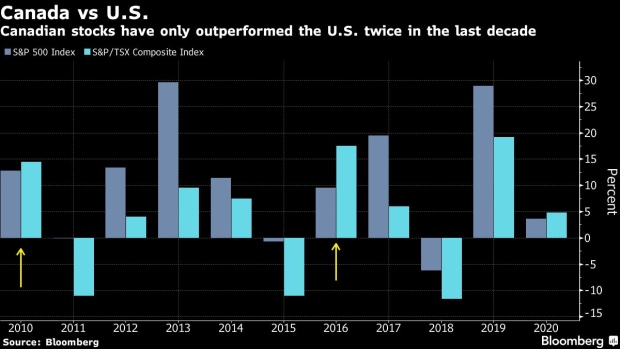Feb 21, 2020
Black Swan Events Remind Stock Investors to Diversify From U.S.
, Bloomberg News

(Bloomberg) -- It’s times like this that jog the memories of equity investors, reminding them the value of diversifying as risk-off sentiment roils U.S. markets.
Eleven years into the U.S. bull market, black swan events like a deathly viral outbreak that could dent the world’s largest economy have brought investors back on earth. At one point on Friday, the S&P 500 Index dropped as much as 1.2%. Yet the Canadian benchmark fell less than half that amount at its lowest point.
A flight to safe havens, the plunge in U.S. long-bond yields and real interest rates sinking further into negative territory have led to a surge in the shares of Canadian gold miners, utility companies and real estate income trusts. These sectors make up about a fifth the nation’s key equity gauge, according to data compiled by Bloomberg.
The nation’s mining stocks are on pace for their best week this year, utilities have posted their longest winning streak in five months and even the Canadian dollar has strengthened this week as the greenback weakened.
“It’s fair to say it’s just a good diversifier,” Greg Taylor, chief investment officer at Purpose Investments, said by phone. “There’s some thought to looking at the diversifier of the Canadian index that has more gold, that has more defensive sectors. It has probably a bit more of a dividend bias.”
A wave of geopolitical events and the coronavirus epidemic that has killed more than 2,200 people and infected more than 76,000 has led Canada’s benchmark to outperform the S&P 500 so far this year -- an event so unusual that it only happened twice in the last decade.
“When in a low interest-rate environment, you’ve got a lot of people looking for yield and when you want to try and find alternative sources of income --I think that’s more exposed in Canada than other areas, Taylor said, adding that gold “certainly helps a lot in times of risk-off.”
Markets -- Just The Numbers
Chart of The Week
Economy
Canadian economists saw a data dump this week with manufacturing and retail sales figures, inflation numbers and international securities transactions. Here’s a breakdown of the releases:
- Canadian retail sales returned to their sluggish ways in December, ending the year with no growth and leaving the sector with one of its worst annual performance ever.
- International investors sold C$9.57 billion of Canada securities in December, according to Statistics Canada. Foreigners sold C$11.26 billion of government bonds and C$400 million of Canadian stocks and investment fund shares.
- Canadian manufacturing sales unexpectedly sank in December, down 0.7% from the prior month -- the fourth straight monthly decline for the indicator, driven by a sharp drop in motor vehicle sales.
Finance Minister Bill Morneau also announced that Canada will relax mortgage qualification rules to make it easier for home buyers to secure financing, a move that could give Canada’s real-estate market another boost.
Politics
Prime Minister Justin Trudeau called for patience and dialog as indigenous-rights protests that have brought rail traffic to a halt across Canada drag on.
In the latest developments of the demonstrations that have entered a third week, Quebec Premier Francois Legault estimated that the blockades are causing losses for Canada’s second-most populated province of about C$100 million a day. Canadian National Railway Co. and some manufacturers have started temporary layoffs, while the Montreal port is facing some congestion, he said.
In another potential blow to Trudeau’s administration, Teck Resources Ltd. said Friday it would take a C$1.13 billion ($852 million) impairment charge if his administration rejects its proposed Frontier oil-sands mine, raising the stakes for the government’s decision.
To contact the reporter on this story: Divya Balji in Toronto at dbalji1@bloomberg.net
To contact the editors responsible for this story: Kyung Bok Cho at kcho7@bloomberg.net, Courtney Dentch, Linus Chua
©2020 Bloomberg L.P.


